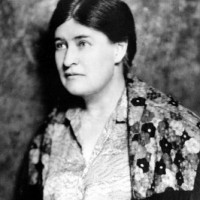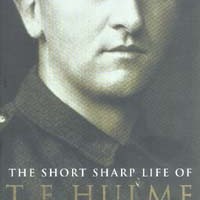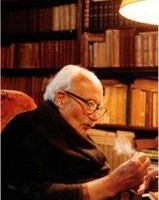The Christian Humanism of Willa Cather, by Bradley J. Birzer
On Sunday, August 11, 2013, my family and I began our now-yearly odyssey into the West. As I write this, our vacation is ending, and I’m typing this from the second floor of a rented house in the Rockies, looking across my laptop out the window at Mt. Ouray.
In two days, our kids have pre-opening at their academy, back in Michigan, and the next morning I’ll attend the same for my job. I’m not quite ready to leave the glories of the American West, but, should I continue to care about a steady income and providing for my family, eastward I must return.
Some of my very first posts at The Imaginative Conservative were written three years ago on such a trek. I can no longer embark on annual trips without thinking of The Imaginative Conservative and without considering editorial mastermind Winston Elliott’s birthday (August 13), a day that will be celebrated some day in the Republic of Texas and, if it still exists, the United States of America.
A significant part of our yearly ritual and travel is my wife reading fiction to me as I drive. Dedra has one of the best reading voices I’ve ever encountered, and, as long as my children aren’t fighting with one another or with imaginary friends, I look forward to her reading almost as much as I look forward to the sites I’m about to encounter on our adventures.
Dedra can read anything and read it well, but she most often gravitates either to the mysteries of Ralph McInerny and Sharon McCrumb or to the fiction of Willa Cather. We both have adored Cather since college. With The Imaginative Conservative’s beloved John Willson, I try to read Death Comes for the Archbishop at least once year. I think a solid case could be argued for considering this novel the “Great American Novel” if such a label needs to be employed. Cather’s West is what the American West should’ve been, rather than what it was. In Cather’s vision, the West is humane, challenging, and, ultimately, in the best Ciceronian sense, cosmopolitan.
Cather’s life
Looking back a century and a half, it would probably not have been wise to have bet on the success of Cather. Born in Virginia, her parents moved her to extreme south central Nebraska (only miles from the Kansas line and only about fifteen miles from the geographic center of the 48 states). Oldest of seven children, her parents homeschooled (or its past equivalent) Willa with their neighbors, raising her around German, Polish, Bohemian, Moravian, Swedish, and Russian immigrants. American Indians arrived in Red Cloud from time to time, as did Americans of African descent. All of this immigration and community with the treeless backdrop of the Great Plains fascinated Cather. Here, as a young woman, she experienced what most sociologists only imagine in their wildest dreams. While the various peoples and peopling of the land mattered to Cather, so too did the land.
Then the Genius of the Divide, the great, free spirit which breathes across it, must have bent lower than it ever bent to a human will before. The history of every country begins in the heart of a man or a woman.
So wrote Cather of her first great heroine, Alexandra, in O Pioneers!.
Graduating from the University of Nebraska in Lincoln in 1895, Cather went east to work as a muck-racking journalist. She gained considerable attention and fame at the notorious but popular McClures and she gave herself fulltime to her fiction in 1912. Her many works include: April Twilights (1903); Alexander’s Bridge (1912); O Pioneers! (1913); The Song of the Lark (1915); My Ántonia (1918); Youth and the Bright Medusa (1920); One of Ours (1922; for which she won the Pulitizer Prize); A Lost Lady (1923); The Professor’s House (1925); My Mortal Enemy (1926); Death Comes to the Archbishop (1927); Shadows on the Rock (1931); Obscure Destinies (1932); and Lucy Gayheart (1935).
Sometime in the 1920s, Cather’s anti-progressive views became quite clear, and the left despised her. She died, horribly, in some literary obscurity, rescued only after her death.
Read the complete article in The Imaginative Conservative
The importance of T.E. Hulme, by Roger Kimball
The history of philosophers we know, but who will write the history of the philosophic amateurs and readers?” Thus did the Imagist poet and essayist T. E. Hulme begin “Cinders,” a posthumously published collection of notes and aphorisms about art, life, and language that he scribbled in his early twenties while traveling across Canada working on railways, farms, and in timber mills. Hulme (the name is pronounced “Hume”) was himself a conspicuously philosophical amateur. Or perhaps one should say “amateur philosopher” (I use “amateur,” as he did, in its most flattering sense). Among much else, he was a translator and—for a few years, anyway–champion of the work of the French philosopher Henri Bergson; he was an early and voluble reader of Edmund Husserl, G. E. Moore, Alexius Meinong, Georges Sorel, Max Scheler, and other difficult, path-breaking thinkers; he was the first to disseminate in England Wilhelm Worringer’s ideas about the “urge to abstraction” in art; he was an enthusiastic proponent of certain strains of avant-garde art, an implacable critic of others. Above all, Hulme was a committed if idiosyncratic Tory, an ardent propagandist for “classicism” and “the religious attitude,” an adamant scourge of pacificism and anything that he could construe as “romanticism” or “humanism.”
Today, Hulme merits an extended footnote in the history of English modernism— the high modernism of T. S. Eliot, Ezra Pound, and Wyndham Lewis. In her recent edition of Hulme’s writings for Oxford’s Clarendon Press,[1] Karen Csengeri calls Hulme “one of the most misunderstood figures in twentieth-century letters.” He is at any rate one of the most fugitive. Hulme is one of those curious figures whose influence outruns his achievement—or at least whose achievement is difficult to reckon by the usual standards. The aesthetic movement with which he is most closely associated—Imagism—is, as René Wellek observed, based on ideas that are “extremely simple and even trite.” Poetry, Hulme wrote in one typical exhortation, should be “a visual concrete” language that “always endeavors to arrest you, and to make you continuously see a physical thing, to prevent you gliding through an abstract process.”
read the complete article in The New Criterion
International Society for Gómez Dávila’s Studies
Here you can find a link to the International Society for Gómez Dávila’s Studies, in his 100th anniversary: www.nicolasgomezdavila.com


